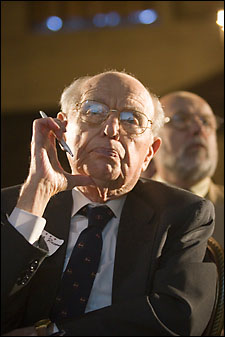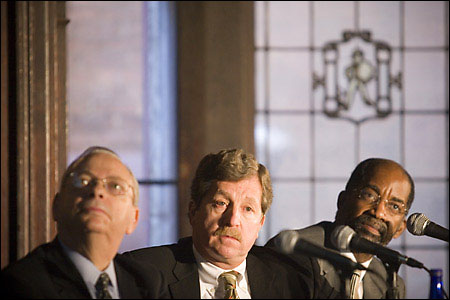Center to honor lifelong work of Julius Richmond
Symposium looks at ‘Child Development in the 21st Century’

Four decades after Julius Richmond wrote a prescription in the journal Pediatrics to fight childhood ills, Harvard is stepping in to fill it, creating a new Center on the Developing Child to foster scientific inquiry and to inform real-world solutions.
Officially launched Tuesday (Sept. 26) during a symposium to mark Richmond’s 90th birthday, the center will be headed by Jack Shonkoff, professor of child health and development at the Harvard School of Public Health and the Graduate School of Education.
Richmond, the John D. MacArthur Professor of Health Policy Emeritus, is a pioneer in the field of child welfare, serving as U.S. surgeon general and assistant secretary for health under President Jimmy Carter. He won the Heinz Award for Public Policy in 2003.
“There’s no problem in the world that’s more important for the improvement of the human condition than how each society cares for its young,” Richmond said, adding that he is encouraged that energetic researchers like Shonkoff and Jim Kim, Bagnoud Professor of Health and Human Rights, are taking on the fight.
“It makes me feel like a supernumerary because they have such great skill and knowledge in figuring out how to translate our basic information into social programs,” Richmond said.
Harvard interim President Derek Bok spoke at the symposium, praising Richmond’s work and announcing a new named chair in his honor, the Julius B. Richmond FAMRI Professorship in Child Health and Development. “FAMRI” stands for Flight Attendant Medical Research Institute, which has championed the fight against secondhand smoke in general and smoking on aircraft in particular.
“In over 60 years of work, Julie has really exemplified academic medicine at its very best: high scholarship, dedicated teaching, and an unceasing engagement with the problems of the greatest importance in the practical world,” Bok said.

Bok went on to say that Richmond’s career exemplifies the interdisciplinary approach that is more and more common today as researchers reach across discipline boundaries to find solutions to intellectual questions and societal problems that don’t fit into neat categories.
“In real life, important problems are rarely only economic problems, or health problems, or political science problems. They’re simply problems, which we must attack from many different directions, but with all the tools and perspectives that are available to us,” Bok said.
Schonkoff was among the introductory speakers at the daylong symposium, held at the Harvard Club of Boston. He said it was Richmond who illuminated the link between poverty, child abuse, and neglect and the health and cognitive problems some children experience, problems that can persist into adulthood. Though the connection is widely accepted today, Shonkoff said society has still not responded in a way that spares millions of children the lifelong effects of abuse and neglect in childhood.
“Julie Richmond was the person who began to show the way,” Shonkoff said.
The new center, Shonkoff said, will be dedicated to seeking the biological causes of the cognitive and health effects of abuse, neglect, and abandonment and then to using the scientific results to further social policies aimed at fighting those conditions.
“Our mission is simple yet profound,” Shonkoff said in a statement. “Our objective is to produce new knowledge and close the gap between what we know and what we do to promote the healthy development of children. To this end, we will devise the science-based strategies to reduce inequalities in opportunity early in life and will work to build broad-based support for implementing those strategies in both the public and private sectors. We view the use of science to improve life prospects for all children as both an important moral responsibility and a wise social and economic investment.”
Harvard Provost Steven E. Hyman said the center takes an important next step in bringing together scholarship and policy.
“We are indeed fortunate to be able to add this University-wide effort to the growing collection of interdisciplinary initiatives at Harvard in which the world’s leading scientists push the boundaries of knowledge both within and beyond their own fields,” Hyman said. “This center takes a critical next step – creating new scientific understanding about health, learning, and behavior in the early years of a child’s life and using that understanding to help strengthen individual life outcomes and improve society in the process.”
Kathy McCartney, dean of the Graduate School of Education, praised the new center’s interdisciplinary focus and Shonkoff’s vision. The center will be a collaborative effort of the Graduate School of Education, the Harvard School of Public Health, Harvard-affiliated Children’s Hospital Boston, and Harvard Medical School.
“Jack Shonkoff has an inspiring vision for the center, to equalize opportunities early in life for all children to reach their full potential,” McCartney said. “All too often there is a disconnect between research and practice for children. Through this center, Harvard scholars across the disciplines will work together so that practice and policy are informed by cutting-edge research.”
Both McCartney and School of Public Health Dean Barry R. Bloom moderated panel discussions at the symposium, which was called “Child Health and Development in the 21st Century.”
In comments during the panel discussion, Bloom said that researchers studying child development are rethinking the basic constructs of nature versus nurture and genes versus the environment. He outlined two large questions to be addressed by the new center: How to assess the impact of a child’s environment on the biological systems at work within a child, and how to understand the varied responses among children exposed to these environments.
Former first lady Rosalyn Carter, who was scheduled to attend the symposium dinner, said that Richmond “taught us that mental health is an integral part of general health and well-being, and that a child’s first years are critical to healthy development…. Our obligation now is to continue his work until every child has an equal opportunity to realize his or her full potential.”
In a letter printed in the dinner program, former President Carter said that Richmond, who also served as the first director of the federal Head Start program, “improved the lives of literally millions of children and adults in our country and around the world, and future generations will be healthier” because of Richmond’s work.
Richmond called the work ahead a “vast task” and said that Shonkoff’s description of him Tuesday morning as eager for results was accurate.
“The fact that there’re 600 million children around the world living in poverty, 100 million whose growth is retarded by the end of the second year, all of these things indicate that we have a vast task ahead of us,” Richmond said. “And I am impatient.”




